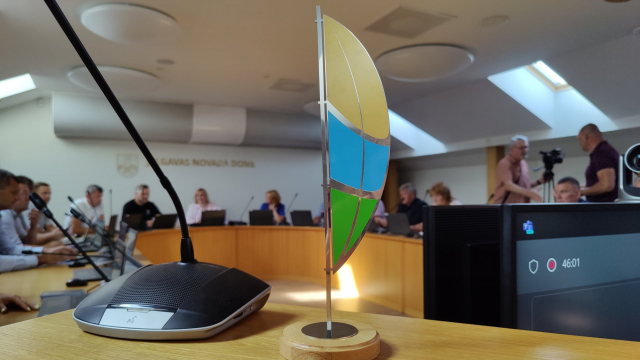Almost a third of all foreign students in Latvia come from India - around 3,000 students.
Prabh's story
Prabh from India studies at Latvia University of Life Sciences and Technologies (LLU) in Jelgava. He chose Latvia because studies are much cheaper than they are in India.
Prabh is a third-year student of business economics. He came to Latvia in February 2018.
"When I landed at the airport, it was very tough for me. Because it was the first time so far away from home.
(..) I had watched YouTube videos before. My mom had advised me to write to the university so they help me get a taxi. I did it, and a man awaited me at the airport. He took me to the hostel,"
Prabh comes from Punjab, where sikhism is popular. Those belonging to this religion do not cut their hair and wear a turban. Prabh does not wear a turban as he feels he would draw too much attention. His friend, Mr Singh, does wear one. Prabh and Mr Singh study together and help each other.
There are no Latvians on Prabh's friend list.
Prabh's daily life is not that exciting - university, work, home. Prabh earns his living himself; however, he doesn't have too many job opportunities. Even a janitor's job demands knowledge of Latvian. He had learned a little Latvian in the beginning but there had been no chance to practice it. Prabh worked at Pakistānas kebabs before, but the salary had been meager. He now works at Wolt.
When asked how he feels in Latvia, Prabh's reply is not too positive. "I can say I like to start my day off on a good note.
But during the day, at least once or twice, I encounter racism problems, hatred, something like that."
This attitude is one of the reasons Prabh doesn't live a very loud life but accepts the university, work, home pattern.
He said attitudes were different - some are kind, but there had been an incident when a lady hadn't let him into the staircase saying "F*ck off, black people!"
"At that point my heart was broken, I thought I was going to cry or something. She was old, I couldn't say anything to her. I called the customer and said, could you come downstairs because I can't get in. And he told her to move and said, don't worry, calm down..." said Prabh.
Mr Singh and Abi
Prabh's friend Mr Singh works at a different delivery service, Bolt. He wears a turban and tries not to notice the looks he gets.
"People mostly think I'm an alien from a different planet. At least I feel that sometimes.
But it is normal, because I have seen that people in Latvia know nothing about other cultures.
So I am getting used to it. Sometimes people ask to take photos with me," said Mr Singh.
Another friend, Abi, studies programming in Jelgava. He is not looking for a job because he works for technology companies remotely. He says that the Indian student situation in Latvia is made worse by "jumping" - people obtain a visa to go somewhere else to work. He says around 40% people might be like this.
Will the students stay?
Asked whether the students think of staying in Latvia, whether they would learn Latvian and integrate into the job market, Prabh says a definite no. He doesn't think Latvia is friendly and has broader plans. Abi doesn't know yet - it depends on the job opportunities. He thinks it is possible to live without the knowledge of Latvian.
"Actually many companies in Latvia employ foreigners, language is not a barrier. The barrier is your skill. If you have skills, you will get the job. Even here. Skills, of course, can also include the language skill," said Abi.
Mr Singh says he would like to stay in Latvia.
"Many people say, you study business, how will you get a job? I say, I will try anyway. But after I get a degree, if I get a job, I would like to stay here."
Latvia has no policy for keeping foreign students
How many foreign students are left to work in Latvia after studying? No one knows that, there are no statistics. Latvia also has no policy in this area. There is no comprehensive plan, there is no contribution to the economy, but the Ministry of Education (IZM) intends to take action.
"We have entered into preliminary talks with the Ministry of Economy. I can't say the exact date now, but it's really the sort of job meetings where these things are going to be discussed. Because, if we look in the context of other countries, it is an absolutely acceptable and common practice that countries attract skilled labor," said Dace Jansone, deputy director of IZM's Department of Higher Education, Science and Innovation.
At the moment, every institution of higher education is doing what and how it wants.
“What we have found is that not all universities have an established foreign student-supportive and inclusive study and social environment. It must be said here that the Latvian society is, as such, lacking tolerance for foreigners. Which is also one of the influencing factors. And it also appears in various types of polls, where foreign students indicate that they would not recommend going to Latvia to study, precisely because of these integration mechanisms and the general attitudes of society,” said Jansone.





























